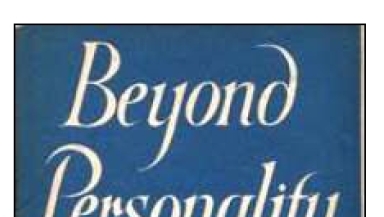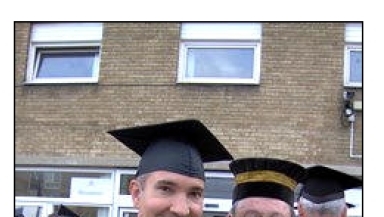
Like many people writing about the 50th anniversary of CS Lewis' death, I could write about his influence on my life through his writings, Christian witness, imagination, and life as teacher. It's true he's been an inspiration and role model for me in these areas.
But I won't write this type of article. Instead, I'd like to discuss a quest: my pursuit to find a first edition CS Lewis book. I didn't have a particular Lewis book in mind - any would do. But what's important is that the book is a bona fide first edition, a volume that - as a collector - would sit squarely on my 'important' shelf.
What's the big deal in finding a first edition Lewis you may ask? Why don't you just go to Amazon or Abe Books and order one, you say. That's fine and all, but it would have been an easy quest, a journey not worth taking. I need a little adventure in my expedition. Plus, I'm cheap. I want to see what I can find without tossing out the high prices of the various online stores that specialise in first editions. Furthermore, my quest began before there was such a thing as Amazon or Abe books, even before the Internet was in use, though I'm sure it was thought of somewhere on planet earth. I wanted my book quest to be a gift of fate, a meeting of the hunter and the hunted, a match made in heaven.
Why a first edition, then, you then may ask? Won't any edition do? Like any collector, having a first edition of an author you respect is a great treasure. Since my childhood-when my mother read Lewis to my brother, sister, and myself-the Irish Don has loomed large in my imagination. And after becoming a serious Christian in high school, then entering the teaching profession upon college graduation - Lewis became a role model of life and thought, a man of legendary status. So having a first edition CS Lewis would be a cache beyond description.
I started collecting books as a teenager. At first, volumes that meant a lot to an emerging mind, works like "Of Mice and Men", "The Old Man and the Sea", and "The Catcher in the Rye". Then came the poetry and art books. And then the theology books during college. I spent several years combing through bookstores, thrift shops, and garage sales to see if the books I enjoyed surfaced. Sometimes I was lucky, other times famine set in, leaving me hungry for more. In the midst of these collecting binges, I'd pick up a Lewis here and there.
I remember the first time I found a complete set of CS Lewis' "Chronicles of Narnia" books for cheap. I was looking through a thrift store in Central California that gifted its proceeds to the homeless. Though not first editions, the books came in a nice casing. I bought them. I also remember buying CSLewis works at a bookstore in San Jose, California-Recycle Bookstore-a frequent haunt of mine. There I found several great works of Lewis, even a couple of early editions; but none them were first editions.
For years, the elusive first edition evaded me. I only found cheap paperbacks, re-issued hardbacks, and even some out-of-print editions, but no first editions.
My quest for the first edition Lewis book was part of the allure of my book journey, a combination of luck and a fine-tuned eye, a little art and a little science. I was always wondering what would arise at the library book sale? What the bottom shelf at the second hand store would produce? What the untapped used bookstore in a small town would generate? What the unchecked stack of books lying on the floor at a garage sale may hold? For years, nothing did. That all changed in 2005.

After several years of teaching and administration in both Christian and public schools, I changed professional gears. I decided to attend seminary. I chose a seminary that at the time held a relationship with Canterbury Christ Church University in Canterbury, England. I picked this school for this US-UK relationship. I was thinking that one day I'd like to teach an exchange programme in England, or at least have the option to do so. So I enrolled in the dual programme in 2002. Some of my classes were with professors based in the US, the other courses were taught through modules with professors based in England. I really enjoyed the whole process. The great thing about this programme was that upon graduation I would travel to England for the graduation ceremony - at Canterbury Christ Church University and Canterbury Cathedral - to be exact.
And upon completion of my studies in 2005, my wife, Melanie, and I joined my parents on a journey across the Atlantic Ocean. After the normal tourist stops (I had already toured England prior to this, so I checked out new areas), we descended upon Canterbury in the county of Kent for a few days before the graduation. I fell in love with the city. The combination of amazing Christian and cultural history was staggering: from Christian authors and thinkers, Augustine of Canterbury, Anselm of Canterbury, and martyr, Thomas Becket, to the breathtaking Canterbury Cathedral, the city is rich in heritage and influence.
It was while browsing the streets of old Canterbury that I found the store: a UNICEF [The United Nations Children's Fund] shop that partnered with Canterbury Cathedral, helping raise money for children effected by war. I walked up to the bookshelves in the back of the store. I began to browse. After thumbing for a few minutes, I spotted it: a small, blue-covered dust jacket with the words, "Beyond Personality" on it. Under the heading, the words, "By C.S. Lewis, Author of The Screwtape Letters" were found. I opened it up to the colophon. It read, "First Printed in 1944." Yes, it was a first edition! Even the inscription pointed to a 1944 date. It was signed from a lady named Dorothy in December 1944.
I couldn't believe my eyes. I looked around to see if anyone was staring at me, my joy obvious. No one was. I thought: don't they realise what I'm holding? Can't they see that I've found the grail? Not only would the contents of this book find its way into the classic, "Mere Christianity," in 1952 (US edition); the historical importance of the book was based on influential lectures CS Lewis delivered on BBC radio between 1942-1944. "Beyond Personality" was the last of the lectures, spoken in 1944 - at the end of World War II - the very year of the publication I was now holding. Lewis was invited to give the lectures by Rev James Welch, the BBC Director of Religious Broadcasting, who had read Lewis and invited him to deliver the messages. The first two lectures were called, "The Case for Christianity" (1942) and "Christian Behaviour" (1943).
To put it another way: this book is both culturally and theologically important. First, it was an important cultural marker during World War II, a reminder of the moral imperative to encourage and enlighten England's citizens with the Christian faith, a moral compass in the midst of sacrifice, pain, and strife. Second, the book is important in that it helps shed light on Lewis' view of the Christian faith, offering a penetrating look at God's work in history and within humanity.
Knowing this, I put the book under my arm; surely, no one would grab it from there, I thought. I casually walked up to the counter to pay for it. It was five English pounds. I would have paid much more than that. And for a minute, I felt like I was stealing it, the cost much lower than I expected. But then I remembered where I was: in England. I'm sure many first edition Lewis works were lying around in shops, in homes, and in churches. I just happened to stumble upon one. It was my day. My quest was near complete. I paid the money, the cashier putting the book in a bag, stating something like, "So you like Lewis? He's popular in America, isn't he?" I don't even remember what I said back, the thought of owning the book too much on my mind.
As I walked out of the store, I strolled up to Melanie. She was browsing shops close by. I pulled out the book from the bag. I held it up, showing her my new find, as a father showing off his newborn. She smiled. My journey was complete.
True, I walked the graduation - in robe and cap-at Canterbury Christ Church University, with vespers being held afterwards at Canterbury Cathedral. True, I met one of my living theological heroes and professors, John Warwick Montgomery - himself a Lewis fan. Dr Montgomery gave the commencement address, challenging us to live, think, and act Christianly in all we do.
And true, I was able to see some of England's finest Christian historical sites, bathing in the beauty and majesty of the land and people. But just as memorable as all these marvelous occurrences were, the little book that I now owned matched them in worth; a short volume with the simple name, CS Lewis, attached to it.
My pursuit of Lewis' book - like Lewis' own life - ended in England, separated by 42 years. But Lewis' life, work, and influence still stand as a testament to God's grace and creative unction in the midst of a world craving for significance. And Lewis - through his works - gives us a glimpse into the imagination infused in the world by the Creator, of whom Lewis spent much of his life pursing with his heart, mind, soul, and strength. Like the characters in Chaucer's "Canterbury Tales", traveling a journey towards a sacred place, we fellow pilgrims do well to follow in Lewis' footsteps. Good thing Lewis left us breadcrumbs-his books-to help us along the way.













